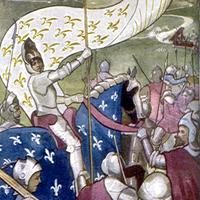44. Magellan's Straits
"Beneath the southern stars' cold gleam, he braves And stems the whirls of land-surrounded waves; For ever sacred to the hero's name, These foaming straits shall bear his deathless fame. " —CAMOENS. It was on September 20, 1519, that Magellan's little fleet put out to sea. There were five ships, all small, all old, and the worse for wear. The flag-ship was the Trinidad, though it was not the largest; the smallest ship was commanded by another Serrano, the brother of Magellan's friend, who was still in the East Indies. One was called the Victoria. Little did they think that she alone would struggle back to tell the tale of the wonderful voyage round the world,—she alone, and without her commander Magellan. Some two hundred and eighty men sailed with the fleet—a medley crew of Spaniards and Portuguese, Italians, French, Germans, Greeks, one Englishman, and some black men.
But the King of Portugal was determined that the expedition smiled on by the young King of Spain should not succeed; and the seeds of mutiny were sown among the captains, who actually sailed out of port with treason in their hearts. Though this came to the ears of the commander, yet "be they true men or false, I will fear them not," said Magellan; "I will do my appointed work. " It was three months before they reached the coast of Brazil, in South America. Great Atlantic storms had driven the frail ships out of their course, water had grown scarce, food ran short, and mutiny was brewing. The Spaniards whispered among themselves that the Portuguese commander was not loyal. One day the captain of one of the ships came on board the Trinidad and faced Magellan with threats and insults. He was not a little astonished when Magellan—a strong man with fierce black eyes—seized him and had him bound in irons and sent on board another ship as a prisoner. This firm conduct on the part of the commander quieted matters for a time. They sailed on south to the river La Plata, and satisfied themselves that it was a river and no strait. On they went, coasting ever south and looking for some opening which should lead them into the great South Sea seen by Balboa six years before.
The cold now became intense, so that, finding a sheltered harbour at last and plenty of fish, Magellan anchored for the winter months. It was Easter time, when another mutiny, long smouldering, burst forth in its full fury. The hardships of the voyage had been intense, the terrific Atlantic storms had strained the worn-out ships. The Spaniards felt they had done enough. But, like Vasco da Gama. the commander was firm. They had put their hands to the plough, there must be no turning back.
It was Easter Day, when two of the Spanish captains boarded one of the other ships, seized its loyal captain, put him in irons, and handed round a generous supply of food. With three ships now in their hands, it seemed easy enough to capture the flag-ship, murder Magellan, and seize the faithful Serrano. But Magellan heard of their design. He sent a messenger with five men bearing concealed arms to summon one of the traitor captains on board the flagship.
"I am not to be caught thus," smiled the Spanish captain, as he read the command and shook his head. As he refused, Magellan's messenger drew his dagger and stabbed him. He fell dead on the deck of his ship. The crew surrendered at once to Magellan's brother-in-law, who now took command of the ship. Magellan blockaded the two remaining ships in the harbour. One of the captains was then beheaded, the other being kept in chains till the fleet sailed off once more, when he was put ashore and left to his fate. Such prompt measures put down mutiny for the rest of the voyage, and once more the ships sailed on their way.
It was now August, in the year 1520, nearly a year since they had left home; but it was not till October that they at last found the bay for which they were searching. With head winds and bad weather the ships fought their way inch by inch between broken land and islands, with strong currents running. In this way a month passed by. The crews begged to turn back. They were riding to destruction.
"If we have to eat the leather on the ship's yards, yet will we go on," answered the brave Magellan. His words came truer than he knew, for later on, broken down with famine and sickness, they actually did eat the leather on the yards.
At last came a day when they reached a cape beyond which lay the open sea—Balboa's Sea of the South. It was the end of the straits through which they had fought for five long hard weeks; and, says the old story, "when the captain Magellan was past the strait and saw the way open to the other main sea, he was so glad thereof that for joy the tears fell from his eyes. " The broad expanse of calm waters looked peaceful to his tired eyes after the heavy storms through which he had passed, and he called the still sea before him the "Pacific Ocean," which name it bears to-day.

